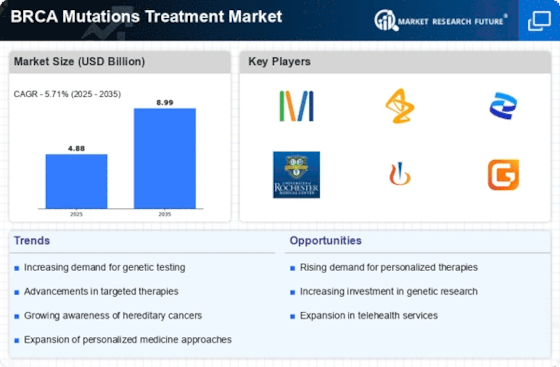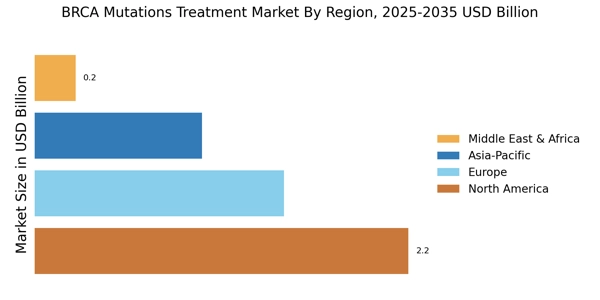Advancements in Precision Medicine
Advancements in precision medicine are transforming the landscape of the BRCA Mutations Treatment Market Industry. The development of targeted therapies that specifically address the molecular mechanisms of BRCA-related cancers has shown promising results in clinical trials. For instance, PARP inhibitors have emerged as a groundbreaking treatment option for patients with BRCA mutations, demonstrating improved survival rates and reduced side effects compared to traditional chemotherapy. The increasing investment in research and development of precision therapies is likely to enhance treatment efficacy and patient outcomes. As a result, the BRCA Mutations Treatment Market Industry is poised for growth, driven by the demand for innovative therapies that cater to the unique genetic profiles of patients.
Growing Awareness of Genetic Disorders
The increasing awareness surrounding genetic disorders, particularly BRCA mutations, is a pivotal driver for the BRCA Mutations Treatment Market Industry. Educational campaigns and advocacy groups have played a crucial role in disseminating information about the implications of BRCA mutations, leading to heightened public interest in genetic testing and preventive measures. As individuals become more informed about their genetic risks, the demand for targeted therapies and preventive surgeries is likely to rise. This trend is reflected in the growing number of genetic testing facilities and the expansion of insurance coverage for such tests. Consequently, the BRCA Mutations Treatment Market Industry is expected to experience significant growth as more patients seek out treatment options tailored to their genetic profiles.
Increased Investment in Cancer Research
Increased investment in cancer research is a vital driver of the BRCA Mutations Treatment Market Industry. Governments, private organizations, and philanthropic entities are allocating substantial resources to understand the genetic underpinnings of cancer, particularly BRCA mutations. This influx of funding supports a wide range of initiatives, from basic research to clinical trials aimed at developing new therapies. The focus on BRCA-related cancers has led to the discovery of novel treatment modalities and improved diagnostic tools. As research continues to advance, the BRCA Mutations Treatment Market Industry is likely to benefit from the introduction of innovative therapies and enhanced patient care strategies, ultimately improving outcomes for individuals affected by BRCA mutations.
Regulatory Support for Innovative Therapies
Regulatory support for innovative therapies is a significant driver of the BRCA Mutations Treatment Market Industry. Regulatory agencies are increasingly recognizing the need for expedited approval processes for breakthrough therapies that address unmet medical needs. This trend is particularly relevant for treatments targeting BRCA mutations, as the urgency for effective options is paramount. The introduction of programs such as the FDA's Breakthrough Therapy Designation has facilitated faster access to novel treatments for patients. As a result, pharmaceutical companies are more motivated to invest in the development of therapies for BRCA-related cancers, thereby expanding the treatment landscape. This supportive regulatory environment is likely to bolster the BRCA Mutations Treatment Market Industry, fostering innovation and improving patient access to cutting-edge therapies.
Rising Incidence of Breast and Ovarian Cancers
The rising incidence of breast and ovarian cancers is a critical driver for the BRCA Mutations Treatment Market Industry. Epidemiological studies indicate that a substantial proportion of these cancers are linked to BRCA mutations, which has led to an increased focus on genetic testing and targeted treatment options. As the prevalence of these cancers continues to rise, healthcare providers are more likely to recommend genetic screening for at-risk populations. This trend not only raises awareness about BRCA mutations but also drives demand for effective treatment solutions. Consequently, the BRCA Mutations Treatment Market Industry is expected to expand as more patients seek interventions that are specifically designed for BRCA-related malignancies.

















